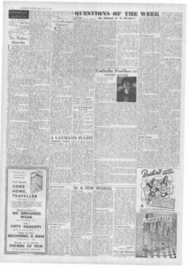Page 3, 18th April 1947
Page 3

Report an error
Noticed an error on this page?If you've noticed an error in this article please click here to report it.
Tags
Share
Related articles
Points From Let Ters
Catholics Are Far More Complicated Than You Think
Selling Books
Parents' Vigorous Protests
How Can The Views Of 131 Women
HUNDRED PER CENT.
CATHOLIC?
by Winifred Charlier
ONE is constantly hearing stressed at public meetings these days, the importance of our being hundred per cent. Catholics if we are to exert any influence at all in the pagan world in which we live, and it occurs to me that many people may well be asking themselves these questions :
What exactly is a hundred per cent. Catholic? Am I one—if not, what steps should I take to become one?
It is partly to clarify my own mind on these points and partly to encourage others to appreciate the importance of the matter that I have decided to put my ideas into writing.
What do we mean by a hundred per cent Catholic?
My answer to this is that a hundred per cent. Catholic is one whose whole life is based on Catholic principles. 1 say whole life deliberately because if only a part or parts of our life is Catholic then we are only fifty or seventy-five per cent. Catholics, as the case may be. If our Catholicism is confined to religious worship, however fervid, and does not enter into our intellectual, political and social life, it is far from being a hundred per cent.
The Regular Catholics There are those who hear Mass and receive Holy Communion daily, who make endless retreats and yet whose influence on those around them is nil — and for this very reason, their judgments, their business transactions and their social relationships are anything but Catholic. It must not be thought that I am in any way condemning true piety which, after all, is the essential foundation upon which every Catholic life should be built.
Why is the complaint of the nonChristian so difficult to refute?
Mr. X in my office is a Catholic but he's a frightful slacker comes late and goes early and lies like the devil "; or " Miss Y in our factory is always going to church but it doesn't seem to make her happy. She's a proper wet-blanket and bites your head off if you ask her to do anything—seems funny to me!"
Little better are those who boast complacently of blindly accepting their faith, making no attempt to assimilate its teaching and who therefore are quite incapable of " rendering an account of the faith that is in them." In any discussion on religious questions they are forced to remain silent rather than exhibit their abysmal ignorance, thereby missing many an opportunity of enlightening their non-Catholic companions who only too often are thirsting for the Truth.
Let no one think that to be hundred per cent. Catholics we have all to be saints.
Although we are all bound to aim at sanctity we know, alas, only too well, how far removed most of us are from this ideal. No! What is required is a vast army of honestto-goodness, everyday Catholics as opposed to Sunday Catholics. Men and women who. realising the frailty of fallen human nature to which they are heir, arc ever ready to avail themselves of the manifold graces offered to fallen mart by an all-loving God in the Sacraments, which 1-le in His infinite mercy instituted for this specific purpose. A hundred per cent. Catholic is, therefore. one who first takes every opportunity of understanding the truths of his faith to the utmost of his mental capacity, proceeds to apply them to all the problems of his daily life, and then does his best to make his behaviour consistent with them.
400,000,000 of Us
If only we were all, four hundred millions of us, aiming at this, each according to his powers, what enormous spiritual energy would be released upon the world. far more destructive of evil than any number of atom bombs in the sphere of matter.
What we must do is to saturate our minds with Catholic teaching— not one isolated doctrine but the whole map of Divine Truth. This will result in our acquiring that most valuable quality—a Catholic mind. We might all begin by a systematic reading of Catholic Truth Society pamphlets on the Mass, Grace, and the Sacraments. This will, 1 think, enable us to make certain that our attitude towards these is a truly Catholic one. So often it is hopelessly out of focus and based almost entirely on feeling instead of fact. The reason for this is probably that a large proportion of Catholics never grow in knowledge of their faith once they leave school, and therefore remain spiritually undeveloped and immature. It is to be hoped that our knowledge of other subjects has increased considerably since our school days, and it would be strange if the religious knowledge that we assimilated with difficulty and reluctance in the classroom were to be sufficient to last us a lifetime.
Next we might meditate with profit on the natural virtues of Justice, Honesty and Truth in regard to which we Catholics sometimes compare very unfavourably with our non-Christian brethren. This is doubtless why the Catholic influence in local public affairs is so little felt.
We should surely first prove that we are Christians before we advertise ourselves as Catholics.
At the present time it is of the utmost importance that we should all acquaint ourselves with the Church's teaching on social ques tions. How else can we hope to form a right judgment on the many vital problems of the day, still less to provide the right solutions.
We cannot in conscience stand aside and leave this to those who in all probability have but vague ideas about the rights of the Individual, the Family and the State.
We Catholics must exert ourselves much more if we are to form a Christian Public Opinion in this country, and this can only be done by striving with all our might, each and every one of us, to be a hundred per cent. Catholic.
blog comments powered by Disqus









